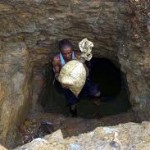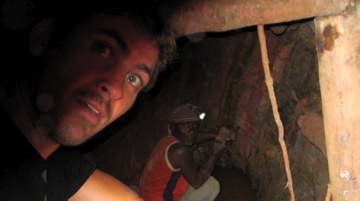
So here’s the problem - it has three parts…
The Congolese jungle is riddled with militia groups, who roam around raping and murdering tens if not hundreds of thousands of innocent people every year - 5 million dead in the last 10 years gives you some idea.
Those same innocent people live largely from the money they make from digging holes in the ground and pulling up small quantities of minerals that they can sell because electronics companies like Apple and Sony need them to make laptops and phones.
The murdering and raping militia groups also profit from the trade either by controlling mines themselves or by taxing the transport of the minerals.
Ergo - every time you buy a new iPhone, you are supporting the innocent people but also inadvertently helping the raping and murdering bastards.
The solution devised by two US senators is currently passing through Congress - The Dodd-Frank Act will force all electronics companies to prove where their minerals come from. Under the terms of the law, Apple, Sony etc will have to be able to show that the minerals they use didn’t come from areas that were under rebel militia control.
Sounds great. Put the onus on the world’s wealthiest companies to take responsibility, so that maybe something might get done. Right?
Wrong.
The response from the electronics industry this week has been to censure the very idea of Dodd-Frank. The industry’s lobby group, the US Information Technology Industry Council, this week warned that rather than embrace the law and start to sort out these supply chains, the big companies would just look elsewhere. The effect, they warned, would be only to encourage business away from DR Congo and thereby rob ‘hundreds of thousands’ of Congolese of vital jobs and throw them ‘into poverty’. Murder and rape or Poverty - helluva choice isn’t it?
What the big electronics companies are effectively saying is “We’re happy to make billions of dollars from the Congo as long as we all turn a blind eye to the murder and the rape. But if you try to make us do anything about it, then it’ll be your fault that everybody starves to death.”
Herein lies the real problem. As long as the industry takes a collective standpoint, nothing will get done. So, how do we get ONE of these companies, just one, to break rank and say, “You know what? We contributed to this mess, so we’re going to stay and invest in helping to make it better.”?
Because that would be a company whose laptop/phone, I’d buy.








